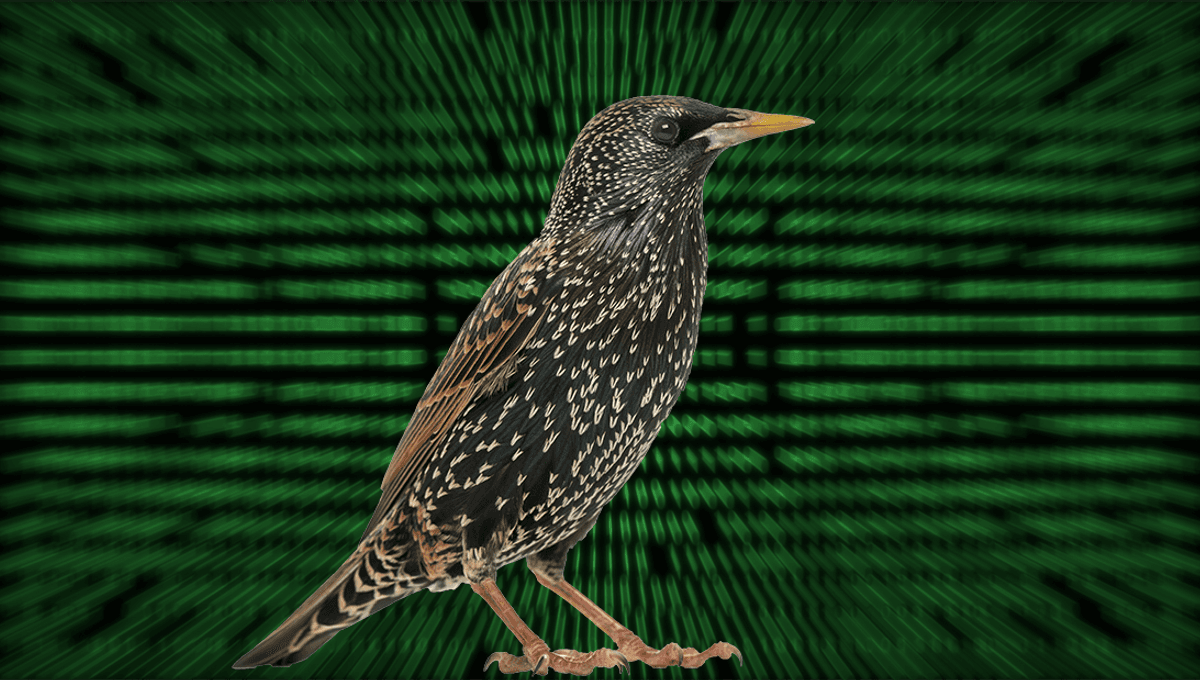-
Feed de Notícias
- EXPLORAR
-
Páginas
-
Blogs
-
Fóruns
"I Saved A PNG Image To A Bird": YouTuber Stores 176KB Drawing Of A Bird Inside A Bird's Song

"I Saved A PNG Image To A Bird": YouTuber Stores 176KB Drawing Of A Bird Inside A Bird's Song
Science and music YouTuber Benn Jordan has stored an image of a bird within a bird, before getting the bird to reproduce the image at an estimated rate of 2 megabytes per second.
Though parrots take all the popular glory for their ability to parrot back human speech, they are not the only species of bird capable of such astonishing mimicry. “Starlings are accomplished mimics. They pick up sounds from other starlings and song birds but also from people and inanimate objects,” Washington State University wildlife ecologist Rod Sayler explains of the birds, which can produce whistles, rattles, pops, and even reproduce the sounds of dog barks and car horns. “How and why starlings incorporate such an elaborate repertoire of sounds into their vocal behavior has been the subject of a lot of research, with no single answer." ⓘ IFLScience is not responsible for content shared from external sites. In his latest video, Jordan set out to show just how capable of mimicry the starling is, and chose a pretty cool and novel way of doing it. Birds produce their sounds using an organ named the syrinx. "The syrinx is similar to our larynx, but whereas the larynx consists of one air passage, the syrinx branches into two tubes like an upside-down Y. Air flowing over vibrating membranes and cartilage near the intersection of these tubes generates sound," the Finger Lakes Land Trust explains. "Birds can modulate the air flow separately in each half of the syrinx. Thus they can make two sounds at once – and some, such as the wood thrush, can even sing rising and falling notes at the same time. They can also switch from one branch to the other without pausing to breathe." Songbirds can have more pairs of muscles, helping them to control the pitch of their song with incredible precision, changing notes hundreds or even thousands of times per second. "When the speed of this gets fast enough, we start seeing amplitude modulation and frequency modulation between the two pockets of air being pushed out of each of the lungs," Jordan explains. "And you might better recognize these terms from their acronyms, AM and FM, as this is the exact same thing allowing a radio wave to transmit an audio frequency to a receiver." For the video, Jordan drew an image of a bird inside a spectral synthesizer, effectively turning the image into sounds incomprehensible to anyone simply listening to it. He then played the sounds back to a starling, hoping that it would pick up the song and begin to repeat it, as they so often do, and if the image would be recoverable when it was played back on the computer. If it could, according to Jordan it "would effectively make himself capable of storing and transmitting image data". At first, Jordan didn't think he'd had much luck. But when he replayed the recordings later he noticed a small bird image in the spectrogram. Skip to around 17 minutes in the video if you would like to see it for yourself. "This little bird successfully learned and emulated the sound in the exact same frequency range that he heard it, effectively transferring about 176 kilobytes of uncompressed information," Jordan explained. Hypothetically, if this were an audible file transfer protocol that used a 10:1 data compression ratio, that's nearly 2 megabytes of information per second. While there are a lot of caveats and limitations there, the fact that you could set up a speaker in your yard and conceivably store any amount of data in song birds is crazy." Don't expect – as some commenters demanded – to play Doom on a swan anytime soon. But it is cool to see such an awesome demonstration of the vocal mimicry of a starling.


